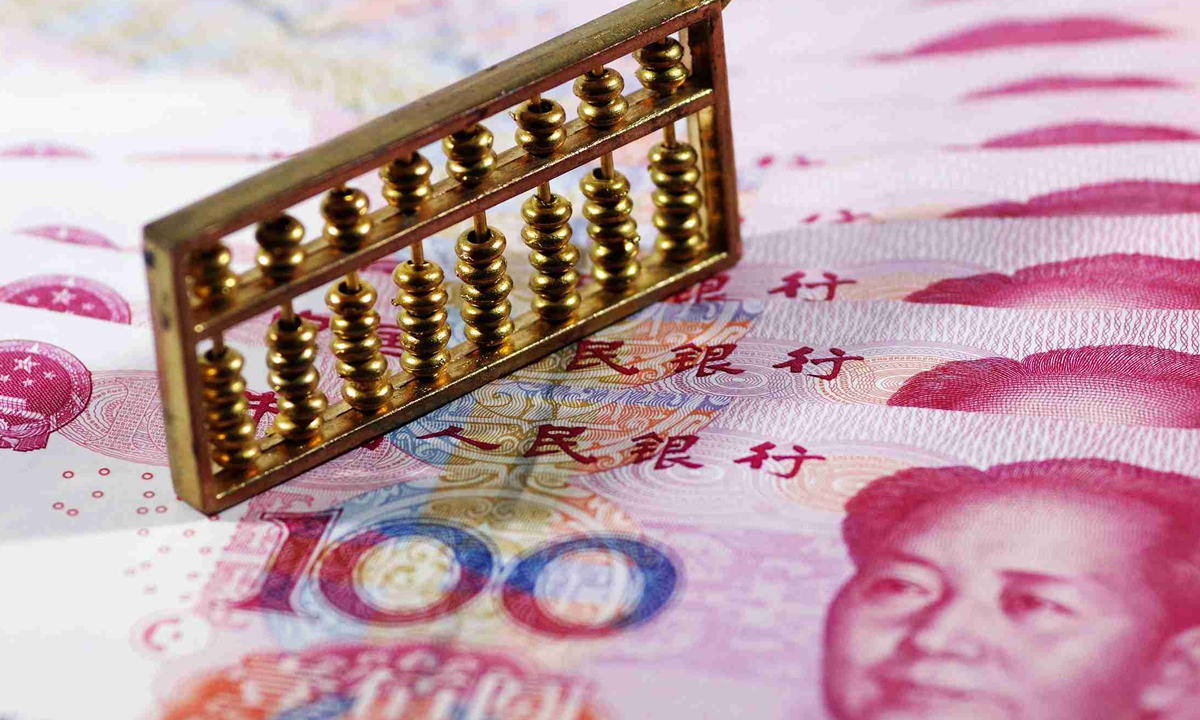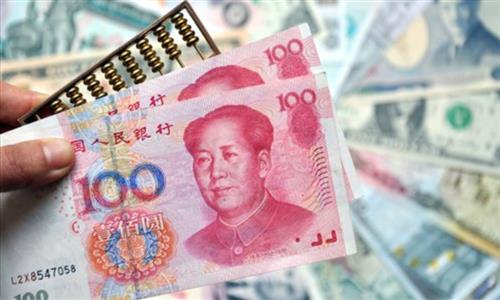
Chinese yuan Photo:VCG
While the Chinese currency has made marked progress in internationalization, it has fallen in value against the US dollar. Earlier this week, the yuan traded offshore briefly slipped to below 7.2 per US dollar, a level not seen since late November 2022.
The devaluation of the yuan came after media reports claiming that some overseas financial institutions are selling the yuan in exchange for US dollar, which is believed to have put increased downward pressure on the Chinese currency.
Although there have been short-term fluctuations, the yuan has no basis for long-term depreciation. But, recent fluctuations remind stakeholders to keep a wary eye on speculative arbitrage behavior that creates a pileup of financial risks. With the internationalization of the yuan, speculative demand for the Chinese currency should be curbed, as short-term speculation could only make the market more volatile.
In recent years, the trend toward what is described as de-dollarization has become increasingly apparent. Although the US dollar will continue to be the main currency for the foreseeable future, economies across the world have realized the urgency of de-dollarization. At present, an increasing number of countries are considering or have changed the US dollar payment settlement to local currency payments.
In this process, the proportion of enterprises using yuan settlement in trade has increased. Subsequently, more liquidity has been injected into the world's financial system as a means to meet rising demand for the yuan. More liquidity into the system means the yuan's offshore market will be encouraged to grow. As the market expands, a key issue on the agenda is to curb speculation and mitigate the impact of overseas institutions' operations on the yuan's exchange rate.
Since March 2022, US Federal Reserve officials have raised the central bank's benchmark interest rate 10 times in a row in an attempt to battle inflation. US interest rate hikes have generated a spillover effect in the foreign exchange market, resulting in a relentless rally of the US dollar and devaluation of many developing countries' currencies. A sharp devaluation of those currencies creates incentives for international investors to hoard the yuan, which is relatively stable against the US dollar. The problem is that if the yuan is sold in exchange for the US dollar, large-scale sales will turn into depreciation pressures, and in this process, the whipsawing of the foreign exchange market is likely to be exacerbated due to speculative behavior.
What makes things even worse is the fact that the US dollar's status as the world's reserve currency gives the US a financial superpower to impose financial sanctions on other countries, which leads to exchange rate volatility and liquidity strains. Some media reports claim that US dollar liquidity strains have prompted some global institutions to sell the yuan in exchange for the US dollar, which has further affected the supply and demand balance of the yuan.
Against this backdrop, it is normal to see short-term fluctuations of the yuan, but speculation and arbitrage should be avoided, which will help maintain the stability of the yuan and further promote the yuan's internationalization.
As countries around the world cut their usage of the US dollar, the Chinese yuan is increasingly being used in global trade. The yuan's primary feature is to serve the real economy. Adhering to this principle will effectively combat speculative money from overseas.
Moreover, as developing countries promote the greater use of local currencies in intra-regional trade and investment, it is necessary to strengthen industrial and supply chains among developing economies and increase the use of local currencies' patiently, step by step.
A super strong US dollar and the fall of other currencies will, to a certain extent, increase the complexity of the issues about yuan's internationalization and the diversification of the international currency system. It is precisely at such times that the international community should be more determined to cooperate to push forward de-dollarization and build a reliable multilateral international financial system.



